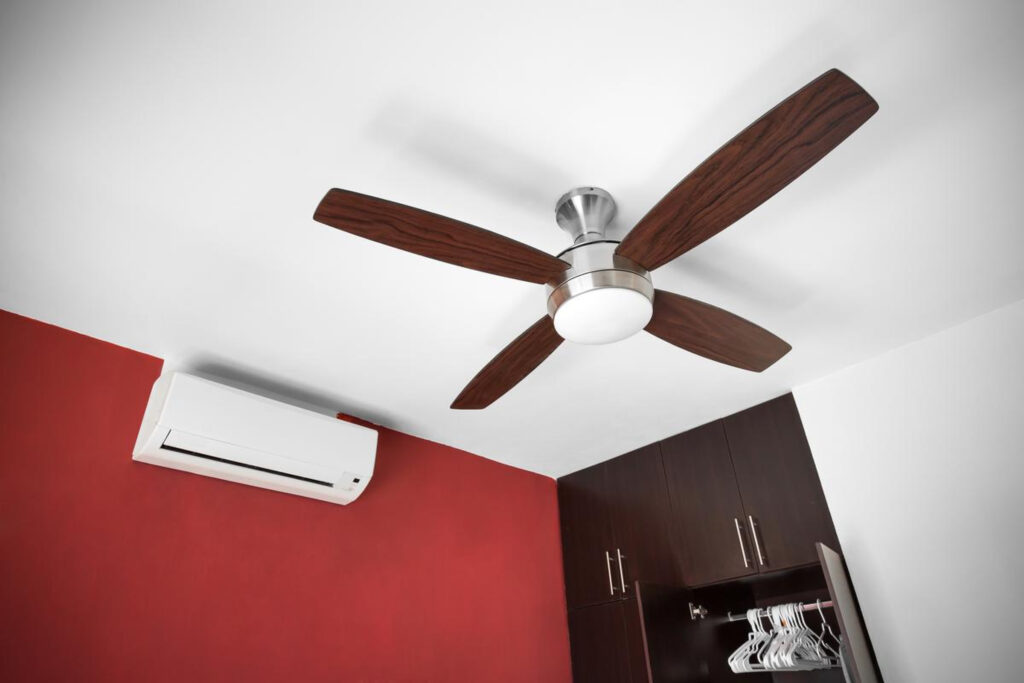Key Takeaway:
Ensuring your loved ones’ safety is paramount, especially when seeking affordable cooling solutions. While ceiling fans offer energy efficiency and elegance, questions linger about their safety. Are ceiling fans a fire hazard? We delve into the risks, causes, prevention, and essential maintenance tips for a secure cooling experience.
Introduction
Your loved ones and your own safety should never be put at danger. Keeping your loved ones at home is the most secure option. If you’re trying to keep your home cool without breaking the bank, you’ve undoubtedly already considered installing ceiling fans. Ceiling fans not only help save energy, but they can also add a touch of class to any space. But, are the fans in our ceiling secure? Are ceiling fan a fire hazard? We did the legwork and got some top-notch information specifically for you. Ceiling fans continue to be a common piece of electrical fixtures nowadays.
As a result, the risk of starting a fire due to a wiring mistake is constantly present. Fire hazards can be mitigated through routine upkeep and checks. It greatly reduces the likelihood of even a minor fire.
Since we now have this information, we can rest assured that the ceiling fan will not catch fire. Find out what sorts of things can go wrong by reading on. A few more questions occurred to me. Please see the footnotes for clarification.
How Likely Is It That a Fire Will Start in a Ceiling Fan?
Perhaps you’re wondering Can flames be started by a ceiling fan? There are estimates that place the percentage of home fires caused by ceiling fans somewhere between 3% and 6%. When a fire breaks out in a home, they are often blamed. The ceiling fan brings it closer to the fire, increasing the risk of burns.
Fire inspectors and insurance adjusters can usually deduce the origin of a fire by looking at the extent of the damage. Fires that originate under ceiling fans spread quickly because their electrical components are positioned behind combustible wallboard. The inspector usually finds that the fan overheated and caused damage to the ceiling joists.
Despite this possible flaw in fire investigation, ceiling fans are rarely the cause of house fires.
See also: Kitchens with Ceiling Fans Why do fires start in ceiling fans?
What Causes Ceiling Fan Fires?
Without fan wiring, installing a ceiling fan might be a challenge. Lights are commonly seen on ceiling fans, which might make installation more difficult. Wiring might cause a fire if not handled properly. A fire is less of a threat than incorrect wiring and installation. A further contributor to the blaze is the accumulation of dust and debris.
The debris might potentially block airflow from the ceiling fan, cause it to overheat, and eventually catch fire if enough of it is present. Do not forget that fan is permanently installed in that location. The ceiling is made of Gypsum board and wooden beams. All of these things can easily catch fire.
Preventing Fires From Ceiling Fans:
Installing your ceiling fan correctly is your best defense against a fire. The easiest approach to ensure that the fan is wired and installed correctly is to hire an electrician. Unless you have experience working with electricity, this is not a project you should attempt on your own.
This is work that is better left to the experts. Choose any ceiling fan you like best. If you hire a professional to handle the more technical aspects, all you’ll have to worry about is how the ceiling fan looks. Ceiling fan blades and vents should be cleaned thoroughly after installation to prevent a fire. You’ve probably seen that the fan blades are covered in dust.
There is a similar buildup around the vents of the fans. Make sure it’s clean and airy frequently. You can keep your ceiling fan in pristine condition by using a microfiber duster with an extension pole.
Also, Read: Can You Put A Ceiling Fan On A Vaulted Ceiling?
How Common Is An Electric Fire?
Electric fires are the second greatest cause of home fires, accounting for around 13% of all home fires, according to the National Fire Protection Association.
Improper electrical equipment and wire installation can result in arc discharge and sparks. Most of these problems occur in the winter because that’s when individuals are most likely to utilize their heating systems. Be extremely careful about electricity and fire because of how closely they are linked. Inspect and properly install all plugs, switches, and other electrical components.
Is There A Risk Of A Fire If The Fans Were Left On Overnight?
Both leaving a fan on all day and leaving it on all night can cause a fire. Overheating and eventual fire can result from leaving the gadget on for too long. A fire could start while you’re sleeping, posing a serious threat. When you go to sleep, you may be too exhausted to respond quickly to a fire.
One of the most common ways people die in flames is from breathing in smoke. Inhaling too much smoke before waking up during a house fire can cause you to lose consciousness.
Therefore, the best method to protect yourself and your loved ones is to switch off all electronic gadgets at least an hour before bedtime.
If the Ceiling Fan Wasn’t On Fire, Why Does It Smell Like Smoke?
Let’s say you turn on the ceiling fan and notice a burning smell. There could be an issue with the wiring or the motor could be overheated. The smoky odor is something that can’t be ignored. If your ceiling fan has a smoky smell, you should not use it. Verify that dust isn’t obstructing the engine and that the burning smell isn’t coming from the fan. If the odor lingers after cleaning, it may be time to call an electrician. Don’t brush these problems under the rug, and go to work on them as soon as you can.
Conclusion:
To answer your question, are ceiling fans a fire hazard? An electrical appliance that fits into a cutout in the ceiling is called a ceiling fan. In such a situation, ceiling fans pose a fire hazard. Make sure the ceiling fan is both properly mounted and cleaned. If you keep up with the fan’s maintenance, you can have it running smoothly for many years.
FAQ
What’s causing the burning stench coming from my ceiling fan?
An overheated thing gives forth a burning odor. The fan motor and other parts require time to cool down before further investigation can be done. It’s also a good idea to avoid breathing in any lingering paint or plastic fumes that might be present. Put the fan on pause and go out for a while.
Does a hot ceiling fan indicate a problem?
It’s true that fans may get hot. That’s because AC motors, which are the most common kind, power them. These motors generate heat whenever they are put to use. When a ceiling fan is turned on, heat is released into the room through the fan’s housing.
Do ceiling fans pose a fire hazard?
If not operated appropriately, fans can potentially cause fires. Every year, improper electrical wiring causes over a thousand house fires. Ceiling fans are sometimes blamed as the cause of fires in homes, despite only being the origin of 3-6% of all fires.
Disclosure: We may get commissions for purchases made through links in this post.









